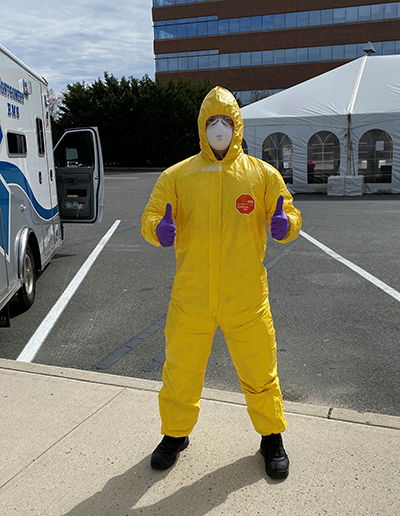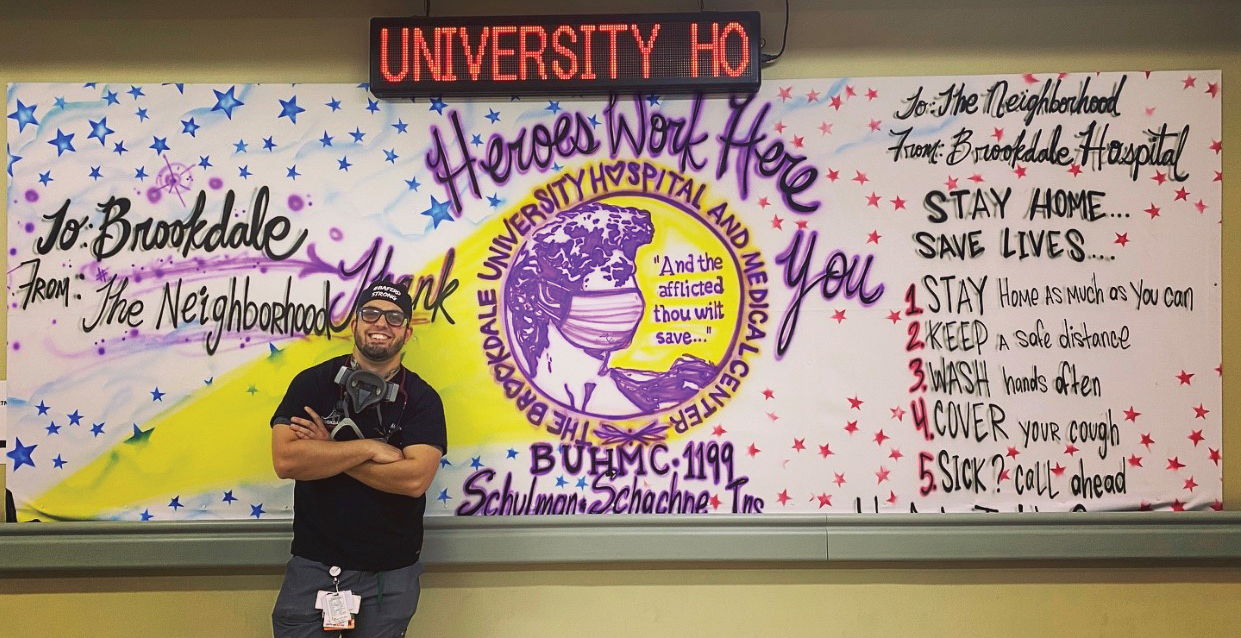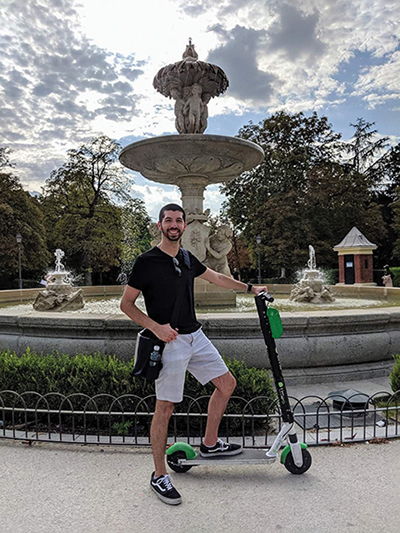Profiles in Courage and Ingenuity
On an individual level, the COVID-19 pandemic has affected each of us in some way, but we have all risen to the challenge. As brothers, we have found ways to stay connected and support one another. As parents, we have reimagined work/life balance. As neighbors, we have done what we can to protect one another and keep our communities afloat.
On the pages that follow, we have highlighted a few of the many brothers who have gone above and beyond to make a difference during this challenging time. Many have put their creativity to work. Others continue to put their lives on the line as the world fights the virus. If you have a story to share about a DU brother who has made a difference during the pandemic, share them with us at ihq@deltau.org so they can be highlighted on the Fraternity’s social media, website or in future publications.
Matt Wierzbicki, Lafayette ’21

As an EMT, Matt Wierzbicki, Lafayette ’21, loves the adrenaline rush. Even though the job requires him to see others at their worst, the rush to help and make a difference makes it all worth it. Lately, that rush has taken on a different feeling. Matt never used to worry for his own safety while on a run, just the safety of his patients. Now, with COVID-19, he does both.
Matt became a certified EMT when he was a junior in high school. As the older brother to a sister with epilepsy, he became interested in medicine at a young age watching her fight her condition. Today, Matt is a neuroscience major with hopes of medical school following graduation. He spoke to the DU Quarterly team surrounded by a stack of MCAT studying books.
Since high school, Matt has served as a volunteer EMT for his hometown Montgomery EMS in Montgomery Township, New Jersey, just outside of Princeton. As a high schooler, he used to run overnight shifts (7 p.m. – 7 a.m.) but now volunteers when he can while home from Lafayette College. As Matt headed back to Montgomery Township this spring after campus closed due to COVID-19, he knew he needed to continue to serve his community.
Between his online course load, research and MCAT studies this spring, Matt volunteered each Tuesday (typically 7 a.m. – 2 p.m.) with Montgomery EMS.
“In the beginning, I was nervous to run because fever is part of the COVID symptoms, and that would not bode well for somebody with epilepsy,” Matt said. “So, I didn't want to bring anything home to my sister, but it's really rewarding usually to run as an EMT, especially as a volunteer.”
For Matt and for first responders across the globe, having enough personal protective equipment (PPE) was essential at the beginning of the pandemic. Especially early on, each patient was treated as if they had the virus, requiring protective suits, gowns, masks and more—things an EMT, for example, would not normally wear on every run. Thankfully, Matt’s organization received a generous donation early on, and did not worry much about their stockpile of equipment. For Matt, the biggest challenges were the safety protocols put in place that, to an extent, limited patient care. For example, normally, multiple first responders may interact with a patient. However, in the time of COVID-19, that contact has been limited to one or two people on the off chance the patient has the virus.
“The human aspect is something that I really value in this volunteering experience because at the end of the day, patient care is about the patient, and I feel like that's something that is diminished when you're doing it from behind a Tyvek suit,” Matt said.
At the end of the day, Matt is just happy to make a difference by serving his community.
“In the immense pressure that this is putting on communities, you see a lot of people rising up to make a difference,” Matt said. “People volunteering to work the testing sites, people volunteering at various organizations like EMS. I think it's really, really amazing. And in some aspects and some cases, the pride of coming out and volunteering outweighs the risk associated with it."
Alex Lauver, Iowa State ’06
The COVID-19 pandemic has forced businesses and individuals across the globe to reimagine the way they work and live. That was no different for Alex Lauver, Iowa State ’06, and his employer, Outdoor Research. Since the pandemic began, Alex has helped the company shift into a new area of manufacturing: PPE.
Personal protective equipment (PPE) has been essential in efforts to prevent the spread of the virus. Early in the pandemic, it was a top priority for all to ensure hospitals, first responders and other essential workers had the PPE needed to continue their work. That’s where Outdoor Research stepped in.
Outdoor Research, headquartered in Seattle, is well-known for manufacturing outdoor gear for athletes: hats, gloves, gators, apparel and more. It also has a second, newer division that focuses on accessories for its military contracts. As Director of Commercial Innovation, Alex has a unique role in the company where he “sits on the fence” between the commercial and tactical divisions. His role is to try to bring both sides together by setting an align strategy. From this vantage point, Alex saw firsthand the switch to making PPE.
“The tactical team switched gears very quickly and started down this pathway,” Alex said. “We did it, A, because we were worried about keeping our factory open and our employees paid. Secondarily, with the DOD connections that we had, and our status as an essential business, we were pretty sure we were going to get asked to do something.”
After quickly ordering new machinery and retrofitting their factories for safety, social distancing and disinfection, Outdoor Research is now making surgical masks and N95 respirator masks that are available for defense contacts, law enforcement and government orders. It’s a product line the company doesn’t plan to end any time soon.
“There's going to be a need and desire for quite some time,” Alex said. “We are proud of this project. We’re proud in so many ways that is project has allowed us to keep a lot of people employed and keep people safe.”
Ryan Cobelli, Georgia Tech ’22
This spring, when many DU chapters were trying to figure out how to conduct virtual meetings and virtual chapter voting, the Georgia Tech Chapter had it covered thanks to Ryan Cobelli, Georgia Tech ’22. Ryan, who owns his own app development company, had an app for that.
Ballot Line is one of a handful of apps in Rybel, LLC’s arsenal. With the use of this app, the Georgia Tech Chapter was able to easily handle Fraternity business in a virtual setting. The chapter has used the app for voting matters, including passing their budget, reallocating money for the spring semester and pass by-laws amendments.
Ryan, a computer science major, began coding when he was in middle school. Soon, with the help of free online tutorials, he taught himself to create iOS apps and formed Rybel, LLC in 2014, when he was just a teen. What started out as an outlet for Ryan to “publish some cheesy little games,” Rybel now focuses on enterprise consulting and building custom solutions for organizations of all sizes. Today, the company has a number of clients across local government, education, entertainment and more.
“This has definitely been a better job than working in the fast-food industry like many of my friends,” Ryan joked.
Ryan created Ballot Line a few years ago at the request of a client who was looking to conduct online voting in a way that was cost effective, secure and flexible. It took Ryan about a month from pitch to launch to create the app. In the years since, he has put more time into the app to add additional features and keep the interface updated. With this work, it took Ryan no time at all to have the app ready to go for the Georgia Tech Chapter.
While unsure exactly where he hopes to land after graduation, Ryan knows he wants to work in software development. His goal is also to continue to his work with Rybel.
“At this point, I’m mostly focused on growing [Rybel’s] customer base. In fact, I’m actually running a special offer right now for the Greek community where any chapter can get access to this software at a reduced price.”
For more information about Ballot Line, visit https://ballot.rybel-llc.com.
Alex Chasin, Pennsylvania State ’13
With just four months left in his residency, in March 2020, Alex Chasin, Pennsylvania State ’13, found himself in the middle of the U.S. epicenter for the COVID-19 outbreak. In the ER at Brookdale University Hospital in Brooklyn, New York, Alex came face-to-face with the virus as he and other medical professionals learned in real time about its effects, prevention and treatment. COVID-19 has also put him in direct contact with the giving spirit of others. In addition to his duties as a resident, Alex also organized a massive food and resource donation operation for his colleagues.
An emergency room is always a place of high stakes and emotion, but with the addition of COVID-19 to the mix, Alex and medical professionals across the globe began to feel the added weight of the virus. So, one day, to show his appreciation and support, one of Alex’s friends—the owner of a coffee shop—showed up at the hospital up with 50 cases of coffee. Immediately, Alex saw the morale of the staff go up. That’s when he got the idea to organize a donation drive.
“With each donation that I brought in, the morale would peak up for that day, and you could just see the excitement in people’s eyes,” Alex said. “It’s not an easy time to go to work, especially the job we do. The biggest reason why I organized the donations was to make sure people were excited and happy.”
Through word of mouth, cold calling companies and a segment on a local radio morning show, by the time Alex’s residency ended in June, more than 75 companies had donated to Brookdale University Hospital. Contributors included major brands like Yeti, Hershey, VOSS water and San Pellegrino, as well as local restaurants, shops and individuals. In the case of Hershey, Alex used a Delta Upsilon connection to secure the gift.
Alex met Steve Balliet, Pennsylvania State ’88, during a chapter alumni event when Alex was an undergraduate. The two have stayed in contact ever since. Knowing Alex was working in New York, Steve, an executive with Hershey, reached out to see if he could help in any way. The result was cases of chocolate for the hospital.
“He sent boxes and boxes of Hershey’s Kisses and Reese’s Cups. It’s going to be Christmas before they run out,” Alex laughed. “You should have seen people’s faces that day. It was awesome.”
Now that his residency is over, Alex has moved on to a fellowship in sports medicine, but he will keep what he has learned from emergency medicine and COVID-19 close to his heart. It has been an experience Alex says has reinforced his love of the profession, from being able to help others to having colleagues who are more like family.
“I think this experience has only made me want to be a doctor more,” Alex said. “As trying of a time as it's been, as emotionally tolling and physically tolling that it's been on me, I've also been able to look at it and say, ‘Damn, this is why I went into this. This is how I'm making a change in everyday life.’ I think it's only pushed me more, to do more and to work harder in the field.”

Matt Panzano, Florida ’11

As an AP Human Geography teacher, Matt Panzano, Florida ’11, talks about pandemics as part of his curriculum. Now, instead of just reading about how humans have reacted and adapted to pandemics throughout history, Matt and his students are living one.
For the past eight years, Matt has taught as part of Freedom High School’s Monticello Academy, a comprehensive college prep program, in Orlando, Florida. This spring, history books met real life as COVID-19 shut down schools across the globe and forced teachers, students and parents to adapt to online learning. Like so many, Matt and his school were on spring break when news of school closings hit. With little notice and not much information, he and his colleagues ended their breaks early and began to prepare.
“Our school and principal did the best job that they could with the limited resources … but it was like being stuck on a ride at Disney World for hours and hours, and possibly days,” Matt said when describing the transition. “There were long periods of time where we were just in the dark with no answers. It was just: make sure that instruction continues to the best of our ability. We all had very little turnaround time to become remote learners.”
For Matt, remote learning looked like this: Spend roughly three and a half hours each morning holding virtual “office hours” where he would host webinars and make himself available to students. Then, in the afternoon, plan lessons and research new assignments and activities that would do well in a digital setting. The rest of his day—as with all good teachers—was spent worrying and caring about his students.
In his experience, Matt has seen the toll lost jobs, childcare concerns and inadequate at-home e-learning set-ups have had on students and families during the pandemic. So, while learning to adapt to virtual instruction, Matt and teachers everywhere were left to figure out how to support students virtually, as well. To do this, Matt created motivational videos. He and other teachers even stood in the rain for a senior drive-through parade in replace of the traditional senior walk-out.
“I'm so proud to work with the people that I work with because these are people that, at the end of the day, you can try to throw any obstacle at them. It's never going to be so much of a feat that they cannot overcome it and they can't accomplish their goals,” Matt said.
Unfortunately, obstacles continue to head teachers’ way this fall. Matt’s school resumed in-person learning on Aug. 10 with the pandemic still looming. Precautions have been taken as best as they can, but the threat of illness remains. Without more funding, larger classrooms and more up-to-date resources, educators are having to make do with what they have.
For those looking to help, Matt offers the following suggestions. In the short term, donate money and supplies to teachers, schools and other programs that assist students. Items such as masks, hand sanitizers, supplies, etc. Long-term, Matt encourages everyone to vote, research candidates’ education platforms, and stay up to date with what is happening with their local school board.
“By fighting for justice for students and teachers, you are saving lives,” Matt said. “That's the most important thing, getting involved, because eventually that will come and pay you back tenfold.”
